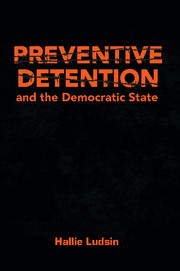Book contents
- Frontmatter
- Contents
- Acknowledgements
- List of Acronyms and Abbreviations
- Introduction
- 1 The Theoretical Framework
- 2 The Policy Debates
- 3 Preventive Detention under International Law
- 4 The History of Preventive Detention in India
- 5 India's Current Preventive Detention Legislation
- 6 India: Preventive Detention and Due Process
- 7 India: The Risk Society and the Slippery Slope
- 8 Preventive Detention in England
- 9 England: Preventive Detention and Due Process
- 10 Preventive Detention in the United States
- 11 The United States: Preventive Detention and Procedural Due Process
- 12 Preventive Detention's Slippery Slope
- 13 Preventive Detention and Liberal Democracy
- Index
Introduction
Published online by Cambridge University Press: 05 March 2016
- Frontmatter
- Contents
- Acknowledgements
- List of Acronyms and Abbreviations
- Introduction
- 1 The Theoretical Framework
- 2 The Policy Debates
- 3 Preventive Detention under International Law
- 4 The History of Preventive Detention in India
- 5 India's Current Preventive Detention Legislation
- 6 India: Preventive Detention and Due Process
- 7 India: The Risk Society and the Slippery Slope
- 8 Preventive Detention in England
- 9 England: Preventive Detention and Due Process
- 10 Preventive Detention in the United States
- 11 The United States: Preventive Detention and Procedural Due Process
- 12 Preventive Detention's Slippery Slope
- 13 Preventive Detention and Liberal Democracy
- Index
Summary
Those who would give up essential Liberty, to purchase a little temporary Safety, deserve neither Liberty nor Safety.
Benjamin FranklinSince the late 1980s, preventive detention as a law enforcement tool has been gaining traction across the liberal democratic world. Historically, democracies prohibited preventive detention as an unacceptable limitation on the right to liberty except as an extraordinary measure during a state of emergency when the criminal justice system is too overwhelmed to manage security threats or for the mentally ill and dangerous who are beyond the criminal justice system's reach. They weighed the societal cost of jailing people who have not yet committed a crime, and therefore remained innocent and capable of abiding by the law, as greater than the benefit from preventing a crime that may not happen. They feared that easy access to detention powers would lead to authoritarianism.
Untill recently, democracies permitted two exceptions to the right to liberty and the concomitant prohibition on preventive detention in response to exceptional circumstances in which the criminal justice system, with its strict due process guarantees, could not prevent or deter severe, criminal harm – during a war or insurrection or for the mentally ill and dangerous. These exceptional circumstances permit the government to invoke a state of exception to bypass the criminal justice system and use preventive detention to protect against the threat. In the absence of these circumstances, democracies refused to allow mere prediction of dangerousness or guilt based on suspicion, not evidence, to justify incarceration. They treated the risk of error as too high and the loss of rights too extreme to be justified in societies that place a premium on human rights and the rule of law. They preferred, instead, to prosecute and punish completed crimes in trials that guarantee due process. As Alexander Hamilton explained in The Federalist Papers at the time of the drafting of the United States Constitution, “[T] he practice of arbitrary imprisonments, have been, in all ages, the favourite and most formidable instrument of tyranny.” Thus, strict adherence to due process in the criminal justice system has been viewed as the cornerstone of democracy; whereas inroads on it have been viewed as evidence of a state's oppressive authority.
As democratic societies have grown more risk averse, they, along with their political representatives, have been increasingly willing to exchange their due process and liberty rights for an increased sense of security.
- Type
- Chapter
- Information
- Preventive Detention and the Democratic State , pp. 1 - 10Publisher: Cambridge University PressPrint publication year: 2016

